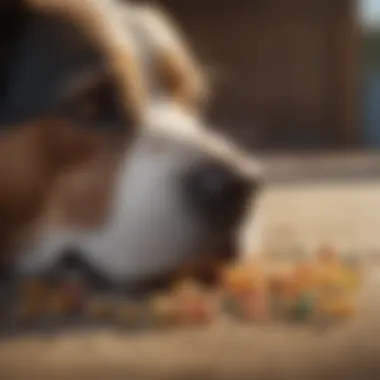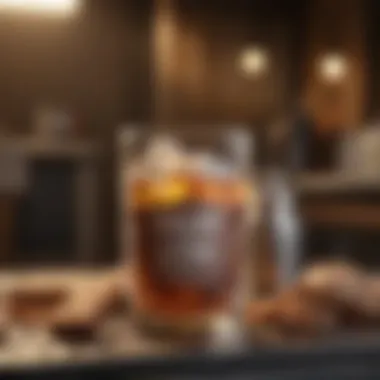Effective Feeding Strategies for Dogs with Diarrhea


Intro
Diarrhea in dogs can be a troubling experience, both for the pet and the owner. Understanding how to manage this condition through proper feeding is crucial. This section will offer insights into why diarrhea occurs, what dietary changes can help, and how to ensure your dog gets the nutrients needed during recovery.
Understanding Your Pet
Breed Traits
Different breeds may respond to gastrointestinal distress in varied ways. Certain breeds, like Bulldogs and Dachshunds, are more prone to food sensitivities or allergies. Knowing your dog's breed can guide you in making appropriate dietary decisions, particularly during episodes of diarrhea.
Common Temperaments
A dog's temperament can affect its behavior and response to illness. Some dogs may become anxious when experiencing gastrointestinal issues. Recognizing your pet's normal behavior can help you determine if their condition is improving or worsening. Comforting your dog is important, as stress can further aggravate digestive issues.
Special Needs
Every dog is unique. Some may require special considerations due to age, weight, or pre-existing health conditions. Puppies and older dogs may be more vulnerable to the effects of diarrhea, requiring different nutritional approaches.
Pet Care Essentials
Nutrition and Feeding Guidelines
When a dog suffers from diarrhea, dietary control is vital. Begin by withholding regular food for 12 to 24 hours to give the digestive system a chance to recover. Then, introduce a bland diet. Common options include boiled chicken or turkey (without skin) and plain white rice. These foods are easy on the stomach and can help firm up stools.
Some helpful guidelines include:
- Gradually reintroducing regular food over several days.
- Opting for high-quality dog food with limited ingredients.
- Avoiding fatty or rich foods, as they can exacerbate diarrhea.
Grooming Tips and Techniques
Maintaining cleanliness is key during recovery. Regular grooming helps prevent skin irritations, especially if your dog is having frequent accidents. Ensure your dog's rear end is kept clean. This can alleviate discomfort and prevent further skin issues.
Health and Wellness
Monitoring your dog’s water intake is essential during diarrhea. Dehydration is a serious risk. Use an oral rehydration solution if your dog shows signs of dehydration. Furthermore, consider consulting a veterinarian if diarrhea persists for more than a day or two.
Training and Behavior
Basic Training Techniques
During this period, reinforcing basic commands can be beneficial. Simple commands like 'sit' or 'stay' redirect attention from discomfort. It can help build a stable routine, thus fostering a sense of security.
Behavioral Problems and Solutions
Stress behaviors may arise during illness, including increased barking or hiding. Observing your dog’s behavior can help you identify signs of anxiety. Providing a calm and supportive environment is crucial.
Mental Stimulation Activities
While physical activity may be limited, mental engagement remains critical. Offer puzzle toys or treat-dispensing devices designed to stimulate their mind without straining their body.
Engaging with Your Pet
Interactive Games and Toys
Gentle interaction through light games can help lighten both your moods. Use soft toys for retrieval games that do not require much physical exertion.
Safe Outdoor Activities
Limit outdoor time to short potty breaks, especially if your dog is still recovering. Avoid walks or intense play that might upset their stomach.
Family-Friendly Pet Interactions
Encourage other family members to participate in caring for the dog. This shared responsibility can strengthen family bonds and provide additional comfort to the pet.


Pet Adoption and Integration
Choosing the Right Pet for Your Lifestyle
Before adopting a new pet, consider how your lifestyle aligns with the needs of a dog. This foresight can reduce the likelihood of digestive disturbances caused by stress.
Preparing Your Home for a New Pet
Create a comfortable space for your pet that is quiet and free from disturbances. A welcoming environment can ease the transition and help maintain their health.
Tips for Smooth Intro
If you already have pets, a gradual introduction is advisable. This can help minimize stress for both the new and existing animals, reducing the chance of digestive issues arising from anxiety.
Dogs are creatures of habit. Maintaining a routine can help them feel secure, which is beneficial during periods of illness.
Understanding these feeding strategies and care options can equip you to support your dog effectively. Immediate attention to a proper diet and environment will be significant in promoting recovery.
Understanding Diarrhea in Dogs
Understanding diarrhea in dogs is a crucial aspect of ensuring their health and well-being. Diarrhea is not just a minor issue; it can signify underlying health concerns. Recognizing the various aspects of diarrhea, such as its types, common causes, and when to seek veterinary advice, greatly assists dog owners in handling this condition effectively.
Definition and Types of Diarrhea
Diarrhea in dogs is commonly defined as an increase in the frequency, fluidity, or volume of bowel movements. This condition can be classified into two main types:
- Acute Diarrhea: This type is sudden and usually lasts a short time. It often results from dietary indiscretion or sudden changes in diet.
- Chronic Diarrhea: This occurs over a longer period. It may signal serious health issues like infections, parasites, or even chronic diseases.
Each type requires different attention and understanding to decide on the best treatment options.
Common Causes of Diarrhea
There are numerous factors that can lead to diarrhea in dogs. Some of the most common causes include:
- Dietary Changes: Switching foods suddenly can upset a dog’s digestive system.
- Food Intolerance or Allergies: Some dogs may not tolerate certain ingredients well, leading to digestive upset.
- Infections: Bacterial, viral, or parasitic infections can result in diarrhea.
- Toxins or Poisons: Ingestion of harmful substances can irritate the intestinal lining.
- Underlying Health Conditions: Diseases like inflammatory bowel disease can necessitate a more complex approach to treatment.
Identifying the cause is essential for effective treatment.
When to Seek Veterinary Advice
It is crucial for pet owners to know when to consult a veterinarian regarding diarrhea in dogs. Some situations that warrant immediate attention include:
- Diarrhea lasting more than 24 to 48 hours.
- Presence of blood in the stool.
- Signs of dehydration, such as excessive thirst or a dry mouth.
- Lethargy or other behavioral changes.
- Any accompanying vomiting or loss of appetite.
Prompt action in these situations can prevent complications and ensure proper care for the dog’s health.
Understanding diarrhea’s complexity allows pet owners to respond quickly and appropriately, aiding in the recovery of their dogs.
The Importance of Diet During Recovery
The management of diarrhea in dogs often goes beyond initial treatment and requires careful dietary adjustments. Proper nutrition is pivotal in aiding recovery and restoring balance. During periods of gastrointestinal distress, a dog's body undergoes several changes that necessitate specific dietary considerations. By focusing on nutrient needs and hydration, pet owners can facilitate recovery, enhance comfort, and prevent further health issues.
Nutritional Needs in Recovery
During recovery from diarrhea, the nutritional needs of dogs significantly change. High-quality nutrients are essential for healing the intestinal lining and restoring gut flora. Most commonly, their diet should shift towards easily digestible options. These include low-fat proteins and simple carbohydrates that are gentle on the stomach.
Key factors to consider include:
- Protein Sources: Dogs recovering from diarrhea should receive protein from sources like boiled chicken or turkey. These are gentle on the stomach yet rich in amino acids necessary for recovery.
- Carbohydrates: Introducing easily digestible carbohydrates, such as boiled rice or potato, helps bind the stool and provides energy that dogs need after episodes of diarrhea.
- Vitamins and Minerals: Essential vitamins and minerals help support the immune system. Ingredients like pumpkin are not only mild but also provide fiber and nutrients crucial for gut health.
Adaptation of food intake is likewise important. Smaller, more frequent meals enable easier digestion and absorption of nutrients, reducing the digestive load and aiding recovery.
Hydration: A Crucial Element
Dehydration is a common risk factor accompanying diarrhea in dogs. Fluid loss can occur quickly and may lead to serious complications if not addressed. This makes hydration a paramount focus during recovery.


Consider the following hydration strategies:
- Fresh Water: Always provide access to clean, fresh water. Encouraging regular drinking can help replenish lost fluids.
- Electrolyte Solutions: Specialized canine electrolyte solutions can help restore vital minerals and hasten recovery. It's always best to consult with a veterinarian before introducing these.
- Wet Food Options: Including wet food in the diet can substantially increase fluid intake. It also may be easier for digestive systems struggling with diarrhea.
Remember: Hydration is not just about drinking water. Including wet food and electrolytes may help achieve the necessary hydration levels that dogs require during recovery.
Combining a balanced diet with a focus on hydration lays a solid foundation for recovery. This awareness not only aids in addressing diarrhea but also contributes to the overall well-being of the dog.
Immediate Dietary Recommendations
When a dog experiences diarrhea, immediate dietary recommendations are crucial for quick recovery. These recommendations help stabilize the digestive system and provide the dog with the necessary nutrients to regain strength. An appropriate diet not only addresses the symptoms but also contributes to the overall health of the pet. By focusing on easily digestible foods, pet owners can minimize the stress on the dog's gastrointestinal tract.
Bland Diet Basics
A bland diet forms the foundation of dietary recommendations for dogs with diarrhea. The simplicity of this diet reduces the risk of aggravating the condition. Bland foods are often low in fat and fiber, yet high in carbohydrates, helping to bind the stool. This basic approach allows the dog's digestive system to recover without the influence of richer and more complex foods. The key features of a bland diet include its non-seasoned preparation and emphasis on digestibility.
The primary aim of a bland diet is to soothe the gastrointestinal tract. It aids in reducing inflammation and discomfort, leading to a clearer path to recovery. However, implementation should be done carefully, ensuring the dog receives the right balance of nutrients while favoring gentle options.
Recommended Bland Foods
Boiled White Rice
Boiled white rice is often the first choice for dogs facing diarrhea. Its main characteristic is its high digestibility, making it easy on the upset stomach. This food is beneficial because it has a low fiber content, which can help reduce the volume of stool. The unique feature of boiled white rice lies in its ability to absorb excess water in the digestive tract. While it has many advantages, such as being affordable and easily prepared, it lacks considerable nutritional value, so it should not be the sole component of the dog's diet for long periods.
Boiled Chicken or Turkey
Boiled chicken or turkey provides a source of lean protein, which is essential during recovery. The tender nature of this meat allows for easy digestion. The key characteristic of boiled chicken or turkey is that it is low in fat, making it ideal for dogs with delicate stomachs. Incorporating this into their diet helps maintain protein levels while avoiding heavy fats that could trigger more digestive issues. A slight downside is that the meat should be plain and without any seasoning or added oils.
Pumpkin Puree
Pumpkin puree is another excellent option for dogs recovering from diarrhea. Its primary aspect is its high fiber content, which can help regulate the digestive system. The beneficial feature of pumpkin puree is that it absorbs water, which can help firm up loose stools. Pet owners often choose pumpkin as it is a natural source of vitamins and minerals. However, it's important to believe that it should be simple pureed pumpkin, avoiding varieties with added sugar or spices.
Feeding Procedure During Diarrhea
Managing the feeding procedure is essential during an episode of diarrhea. Begin with small portions to gauge the dog's tolerance of the bland diet. It is recommended to feed the dog every few hours instead of one large meal. As the dog shows improvement, food can be gradually increased. Close monitoring is necessary. If the diarrhea persists, reach out to a veterinarian for further guidance. The key is to remain patient and attentive to the dog's needs during this sensitive period.
Long-Term Dietary Strategies Post-Diarrhea
Long-term dietary strategies are essential for dogs recovering from diarrhea. These plans are not just about what to feed dogs immediately after a digestive episode, but also how to safely transition them back to their usual diet. Proper recovery can be crucial in preventing future incidents of diarrhea. Therefore, many factors need to be considered for a successful return to normalcy.
Gradual Reintroduction of Regular Diet
After the initial recovery phase, gradually reintroducing the dog's regular diet is necessary. Establishing a gradual transition helps prevent overwhelming the digestive system. Starting with small portions twice to thrice a day can promote easier digestion. Monitoring how the dog reacts to each reintroduced food is essential. If any signs of discomfort or diarrhea return, it may be prudent to revert to the bland diet and consult with a veterinarian.
This method not only assesses the dog's tolerance to different foods but also allows owners to watch for any underlying allergies or sensitivities. Creating a feeding schedule can help track the dog's condition, making it easier to identify which foods may be suitable or unsuitable.
Choosing a Suitable Dog Food
When picking food after diarrhea, focus on options that offer high nutritional value without irritating the gut. Different aspects contribute to selecting the right food, such as protein quality, carbohydrate digestibility, and fiber content.
High-Quality Proteins
High-quality proteins are vital in recovery. They support muscle repair and overall health, essential following a period of illness. Not all protein sources are equal. For instance, proteins from chicken, fish, and eggs are easily digestible. This means they can provide the necessary nutrients without taxing the dog's digestive system.
Moreover, high-quality proteins are less likely to lead to allergic reactions, which is significant when dietary adjustments are being made. This characteristic makes them a popular choice in this context. The advantage of these proteins is their ability to contribute positively to the dog's health without causing further digestive distress.
Digestible Carbohydrates
Digestible carbohydrates are another key component. They provide energy without straining the digestive system. Sources like sweet potatoes or well-cooked oats are excellent options. They are easy on the stomach and generally well-accepted by dogs recovering from diarrhea.
This characteristic makes them beneficial because they can help reintroduce normal digestion while providing energy. However, it is important to ensure these carbohydrates are cooked thoroughly to enhance digestibility.
Gentle Fiber Sources


Gentle fiber sources can aid in recovery as well. They help normalize bowel movements and can stabilize the digestive system. Sources like pumpkin puree or psyllium husk can be particularly helpful. They contribute to overall digestive health without being too harsh on the stomach.
The distinctive feature of gentle fiber is that it does not result in excessive bulk in the intestines, which can lead to further complications. Its advantage lies in balancing the stool while also making sure the dog is comfortable during recovery.
Supplements and Remedies
Incorporating supplements and remedies into a dog's recovery plan from diarrhea can be highly beneficial. Such additions can help restore balance to the dog’s digestive system. They can also assist in rebuilding lost nutrients and enhancing the overall health of the canine. It is essential to recognize that these supplements do not replace a balanced diet but work alongside it to optimize recovery.
Probiotics and Their Role
Probiotics are live microorganisms that provide health benefits when consumed in adequate amounts. They help maintain a healthy balance of gut flora, which is crucial after episodes of diarrhea. A disrupted microbiome can occur due to various factors, including dietary changes, stress, or infections. By introducing probiotics, pet owners can encourage the growth of beneficial bacteria in their dog's gut.
- Benefits of Probiotics:
- Restores Gut Balance: Probiotics help to replenish beneficial bacteria lost during diarrhea.
- Supports Immune Function: A healthy gut flora can enhance the immune response, helping the dog fight off infections better.
- Improves Digestion: They can aid in the digestion of food, making nutrient absorption more efficient.
It is crucial to select a probiotic specifically designed for dogs, as human probiotics may not be effective or appropriate. Generally, probiotic supplements come in powders, capsules, or treats and should be selected based on their strain diversity and CFU count.
When to Use Prescription Diets
Not all cases of diarrhea require a prescription diet, but they can be very effective in specific instances. Prescription diets are specially formulated to meet the unique nutritional needs of dogs with gastrointestinal issues. Some conditions requiring such diets might include severe gastroenteritis, inflammatory bowel disease, or where standard diets have failed to produce improvement.
- Key Considerations for Prescription Diets:
- Nutritional Formulation: These diets are tailored to provide easily digestible ingredients, suitable protein levels, and adequate hydration.
- Monitoring Health: Working closely with a veterinarian while a dog is on a prescription diet is vital. Regular checks ensure the diet is effective and any necessary adjustments can be made promptly.
- Transitioning Back to Regular Food: When the dog's condition improves, transitioning back to a regular diet should be gradual to avoid any further gastrointestinal upset.
In summary, supplements such as probiotics can significantly aid in the recovery of a dog experiencing diarrhea, restoring gut health and enhancing overall wellness. Prescription diets, when required, provide an additional necessary layer of support for dogs with more complex health risks.
Monitoring Recovery
Monitoring the recovery of a dog experiencing diarrhea is a crucial aspect of the overall support process. This vigilance ensures that the dog's condition is genuinely improving and that the dietary strategies put in place are effective. Recovery can be gradual, and the owner's awareness of specific signs can guide decisions regarding ongoing care and modifications in diet.
Regularly assessing the dog's health provides several benefits. It allows pet owners to identify any setbacks early, which could indicate a more serious issue. It also fosters a sense of control over the situation, which can be particularly helpful for concerned pet owners. Furthermore, understanding the recovery timeline can prepare owners for the next steps in dietary management and overall health care.
In monitoring recovery, it is essential to focus on both physical and behavioral signs. For instance, an increase in energy levels or a return to normal appetite can be indicators of improvement. Equally important is to watch for potential setbacks or symptoms that may suggest persistent gastrointestinal issues or the need for veterinary intervention.
Signs of Improvement to Look For
When observing a dog recovering from diarrhea, several signs can indicate positive change:
- Normalization of Stool Consistency: One of the primary indicators is the eventual return to solid stool. If the feces gradually becomes firmer, this is a good sign of recovery.
- Increased Energy Levels: A dog that is starting to feel better will typically exhibit more energy. This may include playing or engaging more with the owner.
- Return of Appetite: A dog will often begin to show interest in food again as recovery progresses. An increase in eagerness during feeding times suggests that the dog is feeling more like itself.
- Stable Hydration: Observing normal hydration levels, evidenced by regular urination and a moist nose, is another sign that recovery is on track.
It's important not to rush the process. Each dog has its unique recovery timeline, and gradual improvements are often the best indicators of health.
When to Reassess Dietary Changes
Reassessing dietary changes is essential for several reasons. As the dog's condition improves, it may require a shift in the feeding strategy to support ongoing health. Here are some indications to consider:
- Continued Improvement: If the dog shows clear signs of recovery, such as normalized stool consistency and increased energy, it may be time to gradually reintroduce regular dog food.
- Stagnation or Regression: If no improvement or regression occurs over a few days, it is vital to reassess the diet. This might involve consulting a veterinarian to confirm the appropriateness of the current feeding strategy.
- Behavioral Changes: Any noticeable changes in behavior, such as loss of appetite or lethargy, warrant a re-evaluation of what the dog is being fed. Sometimes, uncomfortable feelings might arise from the food itself.
The process of reassessing dietary changes should be methodical. It’s wise to make adjustments step by step, observing the dog's response closely before implementing further changes. This cautious approach helps ensure the pet’s comfort and aids in a thorough recovery.
Monitoring recovery provides insight into a dog's health and recovery process, allowing for timely interventions and dietary adjustments.
Ending
In the context of caring for dogs with diarrhea, embracing effective feeding strategies is vital for promoting recovery and ensuring the overall health of your pet. This article has provided detailed insights into the nutritional needs, immediate dietary recommendations, long-term strategies, and the importance of monitoring during the recovery phase. Each section has highlighted that the right diet can not only alleviate symptoms but also support the digestive system's return to normal function.
By focusing on a bland diet initially, pet owners can ease their canine companions back into a state of wellness. Gradual reintroduction of regular food allows for the careful observation of any adverse reactions. Using high-quality dog food elements contributes significantly to the animal's recovery and ongoing health.
The role of hydration cannot be overlooked; it is a crucial aspect of recovery that supports various bodily functions. Pet owners should always keep an eye out for signs of improvement and reassess dietary changes where necessary.
"The journey toward recovery in canine diarrhea is marked not just by what your dog eats, but how you monitor and respond to their needs."
Understanding these factors empowers pet owners to make informed decisions about their dog's diets. The outlined strategies aim to create a pathway to health that not only addresses the immediate concerns but also fosters long-term well-being. With careful attention and responsive care, you can significantly improve your dog's quality of life during and after episodes of diarrhea.
Key Takeaways for Pet Owners
- Immediate Attention: Recognize that diarrhea can stem from various causes, and understanding these can inform decisions on feeding.
- Start with a Bland Diet: Recommended foods like boiled chicken and pumpkin puree provide gentle nutrition that is easy on the stomach.
- Stay Hydrated: Ensuring your dog is well-hydrated is critical, as diarrhea can lead to dehydration.
- Choose Quality Dog Food: As you transition back to regular food, select high-quality options that provide digestible protein and carbohydrates.
- Observe closely: Monitor your dog for signs of improvement or setbacks, which will guide your next steps in dietary shifts.
These key insights prepare pet owners to address incidents of diarrhea with confidence and care.



